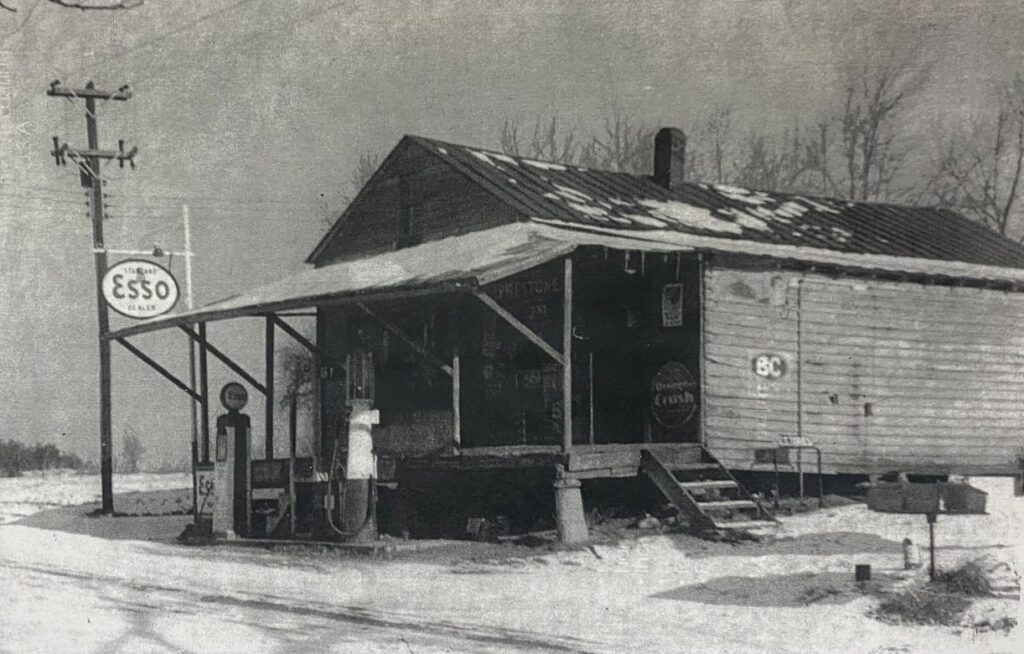
**This research was first published in the December 11, 2024 edition of the Chatham Star-Tribune newspaper as part of Kyle Griffith’s weekly segment entitled “Heritage Highlights.”
The following is built upon an old story from a book by Charles B. Motley of Pittsylvania County. The obscure title from 1977, “Yes There Is A Dry Fork Virginia” touches upon many anecdotes and memories from the county’s history. He shared one story about an old character called Winstead, a mailman who made his rounds over a century ago. Before the implementation of Rural Free Delivery (RFD) in 1902, mail was often delivered by horseback to a country store that doubled as a post office and local residents would come to pick up their mail.
Winstead started his route at the Dry Fork railroad depot, which also supplied several other communities. There he collected the mail from postmistress Rada Pigg (wife of Hutch Pigg) and headed west on foot. He journeyed more than ten miles each way hauling heavy letters and packages toward their intended recipients. When it was most convenient he followed the roads, but otherwise he journeyed through the woods, crossing streams on fallen logs, trudging across the vast fields and farms. In his book Motley attested that “neither winter’s cold and snow nor summer’s rain and heat would keep Winstead from delivering and picking up mail on his star route.”
Eventually he arrived at the first site of his delivery to Giles Store in the Wilmer community near Irish Road. The proprietor and postmaster, Lewis Cassada Giles, received the mail for local families such as the Herndon’s, Pruett’s, Watson’s, and Powell’s. The post office at Wilmer closed in 1902, so the stories of Winstead must take place before that time.
J.M. Francis Store as it looked around the 1950s
Winstead continued west toward his next stop in the community of Swansonville. There, Mr. James Madison “Jim” Francis ran a store at the present location of Katie’s Grill on Franklin Turnpike. Through Jim’s mother, Mrs. Julia G. Francis (born Swanson), he was a nephew and cousin to the postmasters of Swansonville. Mr. Francis kept a loyal bird dog named Lawson who accompanied him to the store each day. If Winstead arrived and had mail for the family, he handed it to Lawson who carried it home to Mrs. Francis. If there was none, Winstead placed an old empty envelope in Lawson’s mouth to carry so she’d know there was no new mail. At the store, Winstead rested and enjoyed his typical meal. It is said that he kept an old cast iron frying pan at the store hanging on a nail. “Winstead’s diet in Swansonville consisted of a piece of fried fat meat, very rarely cooked. He would eat this half done, half raw meat with a biscuit or two brought from home,” Motley wrote. One can imagine Lawson’s delight in the smell of the fried meat, so Winstead placed the cooled frying pan on the floor for the dog to enjoy too. “Following the ‘cleaning’ Winstead would hang the frying pan back on the mail for use the following day.”
The search for Winstead’s full identity and date of birth has proven unsuccessful. One other source about the Francis Store identifies the mailman as a “Winston” but it is unclear which is correct. Hopefully future research will tell. Today it would take about 24 minutes to drive the route between Dry Fork, the old community of Wilmer, and Swansonville on about 19 miles worth of modern roadway. Winstead saved himself several miles of walking by using his reliable pathways along the trees and creeks. With the presence of mail boxes and motorized vehicles, the adventuring mailmen like Winstead became a thing of the past.

